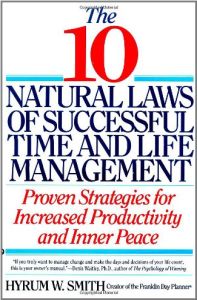Únase a getAbstract para acceder al resumen.

Únase a getAbstract para acceder al resumen.
Hyrum W. Smith
The 10 Natural Laws of Successful Time and Life Management
Proven Strategies for Increased Productivity and Inner Peace
Warner Books, 1995
¿De qué se trata?
Managing your time is more than scheduling and prioritizing. It is managing your life to align your beliefs with how you spend your days.
Recommendation
This book by Hyrum W. Smith would be equally at home in the business or self-help section of a bookstore. Its message is as applicable to a CEO of a large company as it is to a recent high school graduate. Smith liberally peppers the book with anecdotes. These amusing stories provide interesting breaks from the instructional tone he uses in describing the 10 natural laws for managing your time and your life. They also help put his abstract concepts – like the Franklin Reality Model and Personal Productivity Pyramid – into an easier-to-understand context. The stories illustrate the concepts of the book in terms everyone can understand. getAbstract recommends this useful book to executives who want to learn more about managing their time effectively.
Summary
About the Author
Hyrum W. Smith is chairman and CEO of the Franklin Covey Company. He is the creator of the Franklin Day Planner. He wrote Managing Personal Change (1998), and co-authored Gaining Control: Your Key to Freedom & Success (1987) and The Advanced Day Planner User’s Guide (1987).
















Comment on this summary